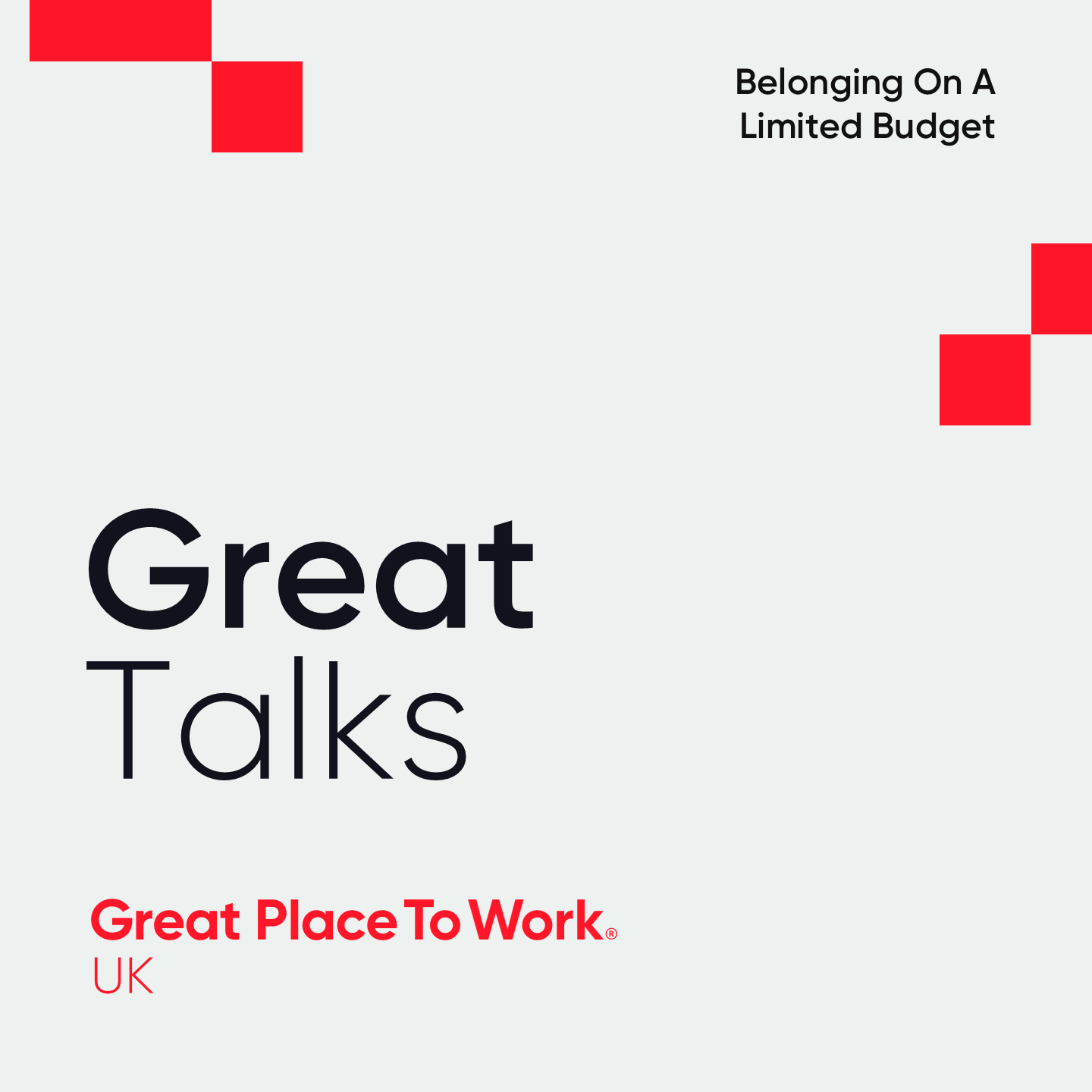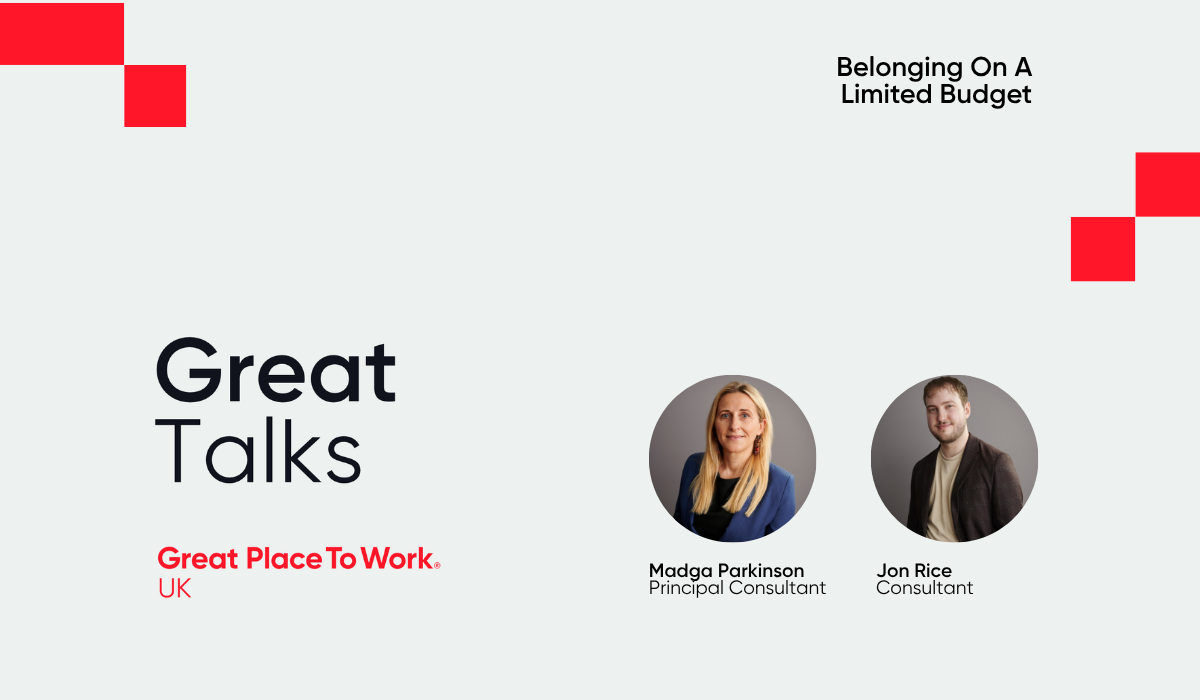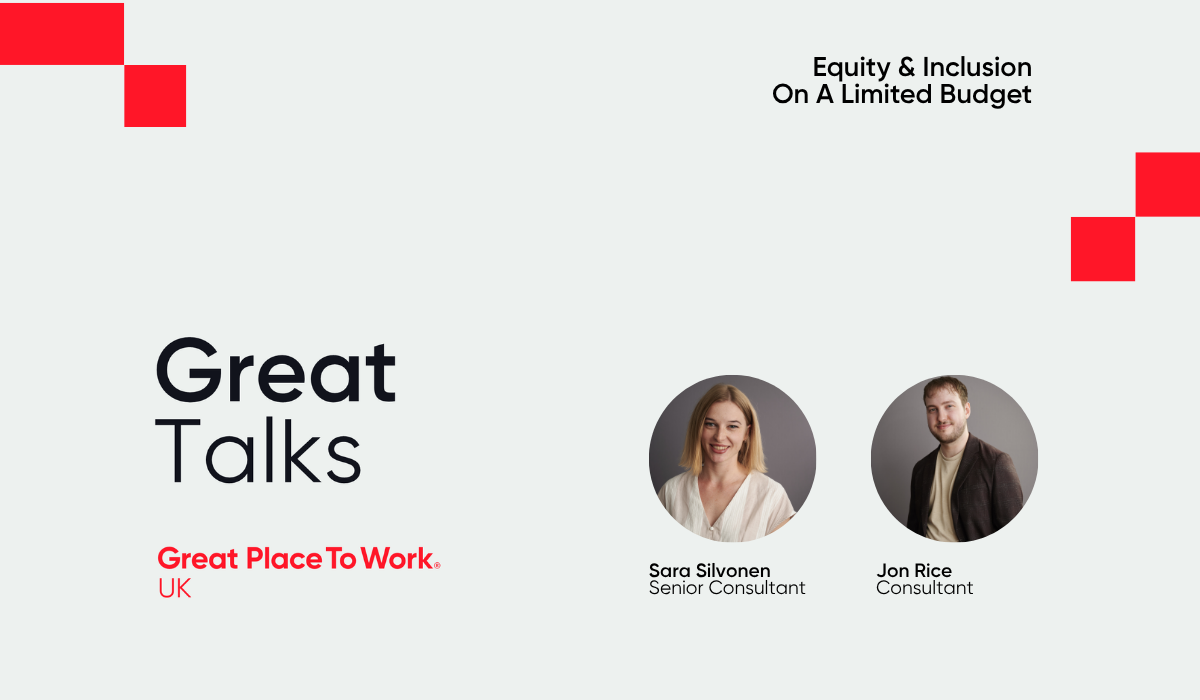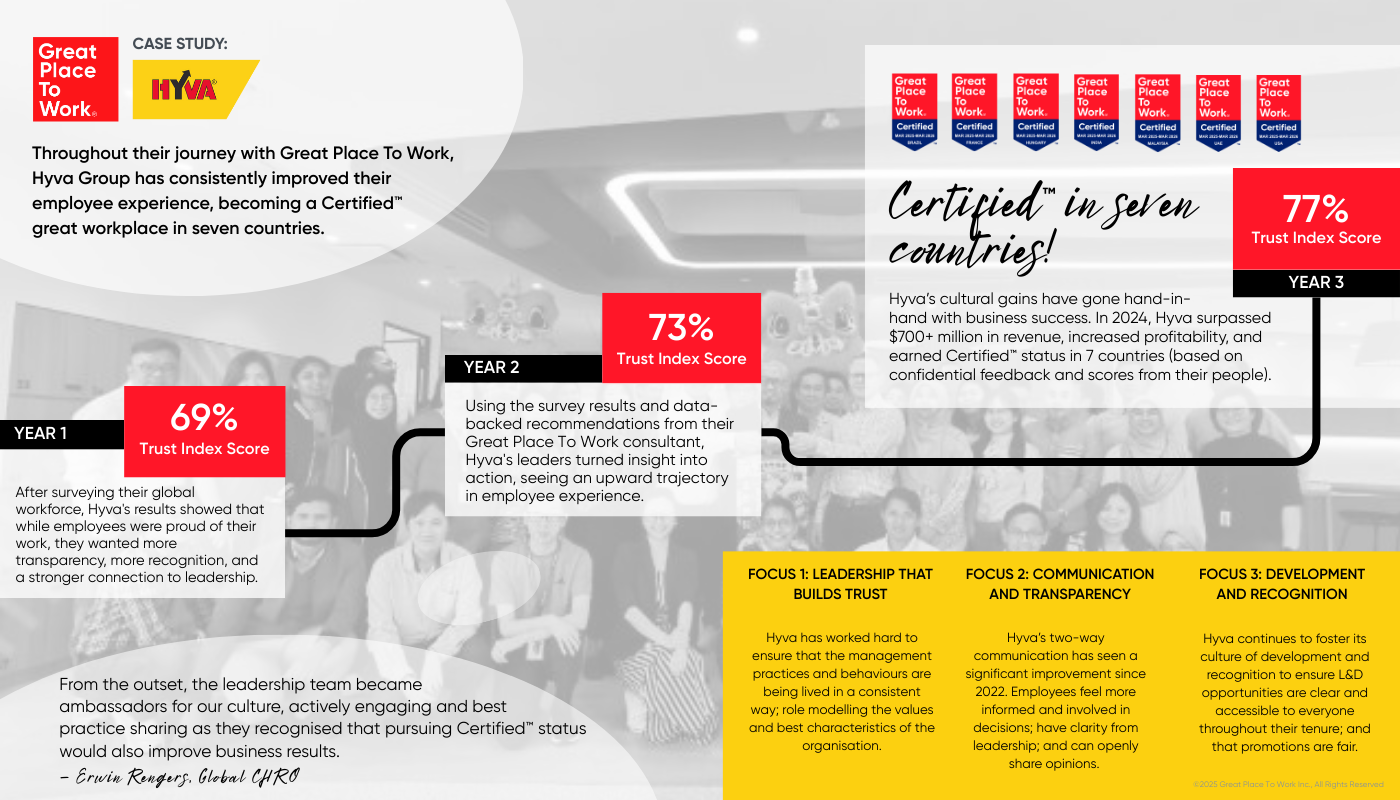James: Hello, and welcome to On A Limited Budget, the series where we explore how you can build a thriving workplace culture without breaking the bank. I'm James, List and Organisational Trends Manager at Great Place To Work UK, and I'll be your host.
Great Place To Work is the global authority on workplace culture. Every year, we get direct feedback from over 10 million employees around the world, working across a range of companies in various industries and sizes, telling us how they really feel about their employer. Diving into the data, we noticed that many organisations share a common challenge: how to build and sustain a great company culture in a way that's cost effective, but still impactful. Today, we're exploring one key element of this critical challenge, building a sense of belonging on a limited budget.
Belonging in the workplace means that your people feel seen, supported and connected, and it's vital to allowing them to thrive. So joining me today, I have Principal Consultant Magda Parkinson and consultant Jon Rice. During our conversation, you'll hear Magda and Jon share practical strategies and insights on how to build a sense of belonging that gives employees the freedom to be their authentic selves. Join us as we explore belonging on a limited budget and discover how even the most budget-conscious businesses can create a culture that unlocks the full potential of their people.
So, Hi both, thank you so much for joining me today and actually sharing your expertise. I know everyone's going to be thrilled to hear about what you have to offer. So it'd be really good just to kind of start setting the scene so we're all on the same page of what we're talking about.
So Magda, if you wouldn't mind starting, could you just start off by describing what is belonging in the workplace?
Magda: Thank you James for the lovely introduction. So when we think about belonging, it's not just about fitting in, it's about that deeper and more profound feeling. It's that feeling that you are accepted and valued as a person.
It's that accumulation of the day-to-day experiences that enables you to feel like you can bring your own full self to work. But at the same time, it's that sense of security that allows you to show up to your workplace authentically, to share your ideas, your perspective, without any fear of being judged or rejected by others. So it's about being respected by colleagues as well as by the organisation.
And if I was to summarize belonging in just one sentence, I would say that belonging is that deep-seated feeling of acceptance and connection to a team and to the organisation.
Jon: I absolutely agree. Belonging is about meeting your employees' needs and providing that value to their working days. As Magda said, it's a complicated web of different things such as wellbeing, inclusion, culture, social environment, but ultimately it's a culmination of that entire employee experience.
It's ultimately about meeting your employees' needs and providing them with what's important to them, so they can truly say, this is where I'm meant to work.
James: I think it's really interesting when you talk about it being that complicated web and that integration of lots of different things such as wellbeing and inclusion and how they all combine together to really build that sense of belonging. And it's really interesting because I think when we hear about belonging now in the workplace, we hear it in connection with diversity, equity and inclusion and how it fits into that aspect. So I think it'd be really good to also kind of hear about how it fits in with those things. So how is it different from say inclusion or diversity?
Jon: Of course. So inclusion is definitely a key part of creating belonging, but they're not exactly one-to-one the same. You can feel included, but not like you belong. So like I said, belonging is that culmination of the entire employee experience and it isn't just around inclusive policies and behaviours.
Inclusion is the behaviours, belonging is the outcome that we want from those behaviours and those policies. I always like to think it like you're at strangers party. The strangers might include you in their conversations, they might make an effort to make you feel comfortable, but unless you find something in common with them or have an interesting discussion, you might not really feel like you truly belong with that group.
I think that's something we can all relate to. It's the same at work. You might feel included, but if, for example, development opportunities are really important to you, if you're not getting those development opportunities, you might not feel like you belong.
James: I love the example that you gave around the party. I think that's something that we can all relate to and all have similar experiences of and I think we can all agree that it is important to feel like we belong in multiple different situations. But of course, what we're talking about now is the workplace. So it'd be really good to put this into context and kind of think more about why actually is a sense of belonging crucial for employees within an organisation itself?
Magda: Sure. So a strong sense of belonging is super important for employees because it drives their engagement, motivation and psychological wellbeing. But at the same time, it's super important for organisations as it has huge impact on their business performance and, of course, the bottom line.
So if you think about it, if an employee doesn't feel like they belong, they might feel insecure at work. They might also feel like they can't be themselves at work. And that fear can really hurt their performance, their creativity and their willingness to work with others.
On the other hand, when people feel that they belong, they are more likely to be innovative, more productive, and they typically work better with their colleagues. That workplace then becomes a source of support rather than stress. And that in turn can help organisations to reduce turnover and absenteeism, which, of course, has impact on companies' profitability.
And at Great Place To Work, we recognise the importance of belonging, so we've conducted our own research. And there are some interesting facts about organisations and employees who experience a sense of belonging in the workplace. And these employees are three times more likely to feel that people look forward to coming to work, which defines that positive working culture where people are happy, motivated, where there is a healthy working relationship with co-workers, and, of course, high levels of camaraderie.
And these employees are also three times more likely to say that the workplace is a fun place to work. So, you know, they enjoy their workplace and experience lower levels of stress. Also, these employees are five times more likely to say that they want to stay with the organisation for a long time.
That has a really positive impact on the business because that means that organisations do not have to spend money recruiting people and, of course, train new staff. So clearly, there is a lot of benefits of having colleagues who feel that they belong. In addition to that, I'd just like to highlight our mission at Great Place To Work, which is to help other organisations become great places to work for all.
And great places to work for all are organisations where every employee, no matter who they are, what their role is, is having that consistent great employee experience. And our research shows that these 'for all' workplaces where diverse employees feel that they belong, grow their revenue three times faster than their competitors. So, as you can see, that's an important outcome. That's a really important outcome for the business.
Jon: And that's a really, really good summary of all those macro sort of levels and the micro on why belonging is important for organisations. But also, belonging ties heavily into employee engagement. Part of being a highly engaged employee is feeling like you belong in the role and the organisation.
Employees that feel like they belong to an organisation are far more likely to participate in what we call organisational citizenship behaviours, which are those little behaviours that go beyond just the base expectations, the job specifications of a role. And they can be as little as just someone taking it upon themselves every Thursday to bring in a cake that they baked from home. Or it can be as big as spearheading employee networks or resource groups.
Basically, when an employee feels like they belong, they can identify with the organisation more, and they want to see that all their colleagues succeed to a higher degree. They're willing to help out and do extra work. And they often are just more pleasant and social employees because they make that little bit of extra effort.
James: Yeah, well, perfect. So I mean, there's really no denying not only is there massive benefits for your employees, but there's also huge benefits for your organisation. Like you said, not only is there support in terms of having experiences of fun at work, but also revenue growth.
So we clearly have statistics to show the importance of belonging and really kind of showcasing what you were saying, Jon, about how this isn't just about the behaviours and actions of leadership and what they do, but also the consistent experiences and behaviours of employees at the same time. And something that I love that you said, Magda, was around when you have a sense of belonging, it becomes a source of support in terms of your workplace rather than stress. And I think that's the aim for a lot of organisations.
So it would be really good to kind of start thinking about what kind of actions these companies can take to really kind of start helping to create a proper sense of belonging within the company. So Magda, it would actually be really great if you could kick things off initially just by kind of sharing for leaders and managers, if we're thinking from the kind of top-down perspective, what are the most effective ways to kind of build a culture of belonging on a budget?
Magda: So for leaders and managers, building a culture of belonging doesn't have to break the bank. It's really about everyday habits and human moments that shape that company culture. And one of the most effective things that you could do is to regularly connect with your team members.
Let me give you an example. So at Great Place To Work, within our survey, we have a couple of statements. One of them says, management shows a sincere interest in me as a person, not just an employee.
And the other one is, management is approachable and easy to talk with. So when we conduct a survey, and the scores for these statements are low, it's often a sign to us that managers within these organisations need to be more intentional about building relationships with colleagues, with employees. We often suggest something really simple, like block out an hour a week just to check in with your colleagues, with your people, and ask open-ended questions.
It makes you really listen and make sure it's a two-way conversation. And I remember one bit of feedback from one company where a manager would regularly visit the shop floor, which sounds great, but all he did was talk about himself. So it's not just about showing up, it's about showing that genuine interest in others.
Another good tip is to express gratitude. It always goes a long way. As a leader, publicly recognise the employee's contribution, whether this is in a meeting, or whether this is a quick shout-out in an email, or even a handwritten note. These small gestures really make people feel valued and remind them that their work really matters.
Jon: That's some really great advice, and I know if I received the handwritten note, I would feel very valued. I always kind of approach this from literally the opposite point of view. I think with a lot of these things, it's easy to tackle belonging if you're looking at what's stopping that belonging, what's stopping the culture from making people feel like they belong.
So identify those barriers for groups and individuals within your organisation. It's a really great exercise for both improving belonging for your current employees, but also training yourself to be able to identify barriers for belonging more generally, which can solve issues before they even exist for new employees that haven't joined yet. Ensure that every employee has the appropriate mechanisms to voice their opinions.
Give that feedback and report on things that are causing them issues that might impact on their feelings of belonging. To make people feel like they belong, you have to show them you think they belong too, and they're not only valued for being a cog in the machine and the work they do, but also who they are and what they bring to the table outside of work.
James: No, absolutely, and I think this is what is really important here is what you were kind of saying initially Magda, around it's not just so much about the visibility of leaders and managers, it's that actual emotional connection and the kind of personal kind of touches they're actually having with their employees and how they're communicating with them, not just talking about themselves, but actually getting to know people and really feeling like they're included and part of the conversation.
And it's as you both sort of mentioned, it really does come down to those behaviours and actually how they're role modelled and shared and showcased by leaders. And of course this isn't just the responsibility of leaders themselves, as you both mentioned, this also comes down to the employees and how they interact and communicate with each other. So really bringing it back actually just to think about more of the way that the employees work together.
If Jon, if you wouldn't mind starting off this one, what are some simple or practical things an individual employee can do to foster a sense of belonging with their colleagues?
Jon: So on this individual level, it's very similar to what we would say from an inclusion point of view as well. Demonstrate those inclusive behaviours such as actually listening to colleagues, making time to hear other employees' point of view. And also don't assume information about people's personal lives, such as whether they're married or have kids, until they themselves have told you.
Show an interest in your colleagues' lives outside of work, but also don't be too pushy if they don't want to tell you too much. Everyone has a right to privacy after all. But essentially by listening to people and showing an interest in them, you're showing you care about them much more than just their job role, which is probably the most powerful thing an individual employee can do on the belonging front.
And the last thing I'll say is be aware of when you might be making someone feel like they don't belong. Don't go out for team drinks without inviting everyone in the team. If someone doesn't drink or they have time commitments, such as picking up the kids after work, maybe consider also some days getting a team coffees or having lunch together as well to really kind of give people those different opportunities to socialise with their colleagues. And again, showing them they're valued too.
Magda: As Jon was saying, I think that small intentional actions make a big difference in helping colleagues feel like they belong. You don't have to be a manager, you don't have to be a leader to make a difference. Start with simple gestures like greet people by their name each day and take genuine interest in what's going on in their lives.
And yes, actively listen. Put your phone down, make eye contact, show that their perspective is important to you. And also offer support when you see that some of your colleagues are trying something new or are stepping out of their comfort zone.
And if you ever conduct a team meeting, make sure that you make a space for everyone's opinions during these meetings. And another good example is celebrating personal milestones. So whether it's a birthday or work anniversary, or even congratulating someone on an achievement outside of work, it doesn't have to be elaborate. A simple message or a team shout out can go a long way in making someone feel valued and seen.
James: Wonderful. And everything that you have described just sounds like easy, actionable things that employees can actually take to make sure that they're really including people around them and really having those personal touches and really getting to know people on a level that they're comfortable with. And really treating people as they really want to be treated fundamentally.
And I think we sometimes forget that we're all different and we all therefore experience a lot of different barriers. And as you were saying, Jon, this can have a huge impact to a sense of belonging when we don't realise the kind of barriers that we potentially face to having that feeling of inclusion and ultimately that sense of belonging in an organisation. So I think it's really important that we not only need to try and be open and communicative with each other, but we also need to try and be aware of actually how can we identify these issues and just make sure that we have that sense of belonging within an organisation.
So Jon, just to refer back to you, because you did touch on this point earlier, how can an organisation identify when employees might not feel like they belong and what steps can they take to actually address this?
Jon: So like you said, like I've said previously, make sure every employee has the ability anonymously and otherwise to tell you when this is the case, give them those feedback mechanisms. As well as this, empower all employees to be able to report when they might feel like a colleague has been excluded from things. So not just employees being able to report their own feelings of exclusion, but also when they perceive it in others as well. Having all employees aware and looking out for these things is much better than just having management's eyes on these things.
Magda: We can spot employees who perhaps don't feel like they belong by observing certain warning signs such as employees withdrawing from team conversations, showing a drop in participation or enthusiasm, missing social events or, for example, consistently not putting their cameras on during the team meetings if they work remotely, or even become less productive for taking more absences than usual. So for us as managers and employees, it's important that we should keep an eye out for those warning signs and actively check in with colleagues.
James: I think all of us here can appreciate that we're actually going through the same process with cameras on at the moment. We have that conversation internally to make sure that we're all showing that presence and sometimes it's the little things that we often forget actually has such a huge impact, especially if you are a presenter and you want to make sure that people are engaged and really showing that they want to be there at the same time. But then I think it always then comes back to the same point which is really touching on creating a sense of belonging is not just a responsibility of managers and leaders, it's a responsibility of everyone.
As you mentioned, it's everyone trying to identify the signs of when belonging potentially isn't happening for someone and the steps that need to happen to kind of create that inclusion. One of the things that we just discussed around not having cameras on is that massive change that we've all experienced in workplace culture around hybrid and remote working. And for me, I kind of think this must have a huge impact on a sense of belonging in comparison to what it would have typically been like in person.
So just to start off with you Jon, how does remote or hybrid work affect the experience of belonging and what can organisations do to bridge the gap?
Jon: Of course, office-based working is inherently more social than home-based working. I think that won't take any listeners by surprise, at least in the majority of cases. Working from home, whether fully remote or hybrid, does de-emphasise that social element of belonging.
Now for some people that might be a good thing, they may prefer the relative peace and quiet of being at home and controlling their environment that actually makes them feel like they belong more at the organisation. I know that's true for me, but other people may feel like this is an element that's missing and it could negatively impact on their feelings of belonging. So for smaller hybrid or remote teams, it can be effective to have a slot booked every week where the team comes together, they get updates on important things, they have that space to talk about the work they've done, and just to have a chat with each other and have that social element brought back in.
But of course, it also heavily depends on the role and the type of work that people are doing from home. For our own roles as Consultants at Great Place To Work, I spend hours every day on video calls to clients, presenting them data and answering their questions and talking them through the process. So I actually do get a big dose of socialisation inherent to my role every single day.
Some days that client interaction is enough, and then sometimes I would like to have a little chat with my colleagues and have a call. It does depend on the day, but it's nice to know that we have that culture when my colleagues are only a Teams message away from a nice chat. Other roles might not have this social interaction as part of their roles.
If an employee is working from home all day and their job is admin or coding or things like that, they might have a day where they just don't speak to anyone at all. So then it's extra important to have those check-ins, those coffee calls, and things like that to ensure that every employee's social needs are met. Of course, every employee is different, so this will be a different level of need from employee to employee, which is why it's important to kind of have the line managers be extra aware of what their individuals are like in their teams.
Magda: As Jon said, remote and hybrid working definitely changes how people experience belonging, and it's not the same for everyone. Some people love working from home. For them, it can actually make them feel more connected to the work and the company, maybe because they have fewer distractions, maybe more flexibility.
But for others, it can feel pretty isolating. They might miss those spontaneous informal chats they would normally have in the office. So how do we fix that?
Well, I think organisations need to be really deliberate about creating those moments of connections. It doesn't have to be anything over the top. It can be as simple as kicking off a virtual meeting with a few minutes of casual conversation, or as Jon mentioned before, the informal coffee chats, where people just talk with no strict agenda.
Those small things can go a long way in recreating that social aspect of work that it's very easy to lose when you are working behind the screens. And another example that makes a huge difference, it's keeping people in the loop. So when you're working remotely, you could be pretty isolated from it all. So leaders should make an effort to share updates openly and invite input from everyone. So not just the people that happen to be in the office get the update.
James: I think one thing that I've always loved about this podcast is the answer is always so simple. We just don't need to overcomplicate things. What we're wanting to do is just have those personal human connections that really just needs the check-in, connect, and then communicate.
We just need to make sure that we're really understanding individuals' people's needs and really trying to make sure we're engaging with them and feeling like we're supporting one another and really having those opportunities for those, as you've mentioned, those small personal connections. Even if we're not in the office together, there are opportunities where we are meeting or we're coming into collaboration groups where we can check in about things that aren't work-related and create that space and that opportunity. But everything you've mentioned so far has been incredibly insightful in terms of all the different actions that companies can take.
And I would really love to draw this podcast to a close by really thinking about if you could give one piece of advice to people leaders on an initial step for creating a workplace culture where people feel like they belong, what would it be? And Jon, we'll start with you.
Jon: So anyone who's listened to any of these podcast episodes before can probably guess what my one step is going to be, because it's been the same for all of them I've been on. Empower your line managers. Line management is the first relationship most employees will have when they join the company and it really sets the tone for the rest of their time there.
So managers need to be personable, they need to show an interest in the employee for all the reasons we spoke about before, and empower them in return to be able to report any behaviours or processes that are anti-belonging. And of course the line managers also need to be empowered themselves to report on these things.
Magda: And for me it will be truly listen before launching any new initiative or making changes. Take time to really understand how people are feeling and that could be through informal conversations, open communication channels, more formal 'how are you' conversations which we often have with our senior managers at Great Place To Work, or poll surveys. It's amazing how much insight you can gain from simply asking and listening.
When people feel heard they feel valued and that's the foundation of belonging.
James: Thank you both so much. Everything you said so far has been incredible and I just wanted to say thank you for sharing your insights and really kind of giving this advice. I know all the listeners will be thrilled to hear everything about it and yeah I just wanted to just say to our listeners hopefully you've gained some helpful tips and tricks on how you can foster belonging on a limited budget and thank you so much for tuning in.
Make sure you're subscribed wherever you get your podcasts and sign up to our newsletter so you get notified when our next episode is live and to find out more about how we can help you measure and improve your company culture visit us at greatplacetowork.co.uk











